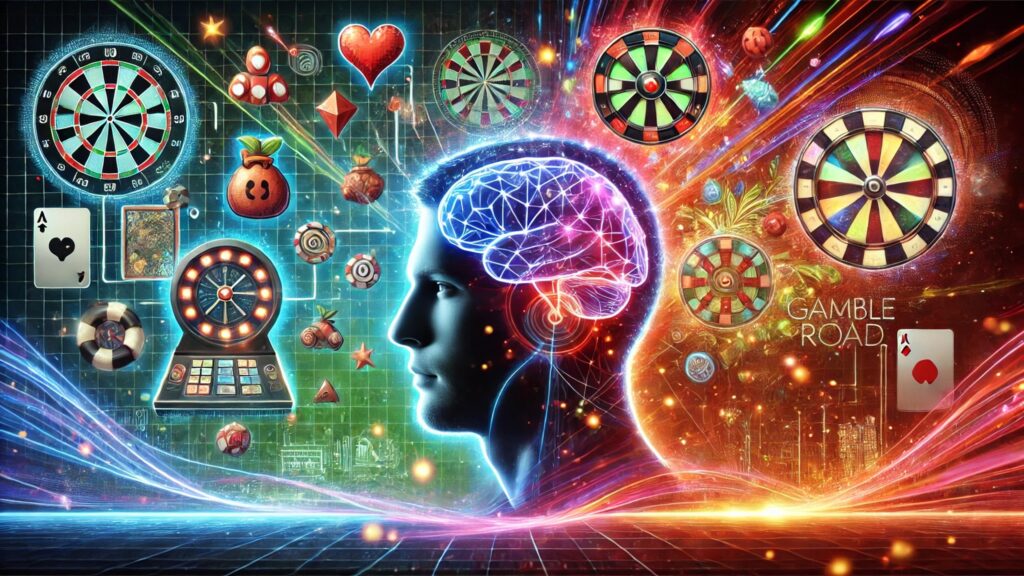Casinos are designed environments, meticulously crafted to encourage players to immerse themselves in the thrill of gaming, and understanding how casinos use psychology is key to appreciating their effectiveness in attracting players and keeping them engaged.
The Sensory Symphony: Orchestrating the Casino Ambiance
From the moment you step inside a casino, you're enveloped in a carefully constructed sensory experience. This isn't accidental; it's a deliberate strategy to manipulate your perceptions and encourage you to gamble longer and spend more. The goal is to create an atmosphere that is both stimulating and disorienting, keeping you in a state of heightened excitement and reduced awareness of time and money.
The Power of Sound and Light
Casinos are masters of auditory and visual stimulation. The constant clatter of slot machines, the excited shouts from the craps table, and the melodic chimes signaling wins create a dynamic soundscape that is both energizing and subtly hypnotic. These sounds are often designed to be 'near-miss' sounds, triggering dopamine release even when you haven't actually won, reinforcing the desire to keep playing. Visually, casinos are a riot of color and light. Flashing lights, vibrant carpets, and mirrored surfaces create a sense of excitement and disorientation. The lack of natural light and windows further contributes to a timeless environment, making it easy to lose track of how long you've been playing. For example, a study by the University of Nevada, Reno, found that specific sound frequencies used in slot machines can increase arousal and risk-taking behavior in gamblers.
The Psychology of Casino Layout
The layout of a casino is far from random. It's a carefully planned maze designed to maximize player exposure to gaming opportunities. Casinos often employ a 'labyrinth' layout, making it difficult to navigate and exit. Essential services like restrooms and ATMs are intentionally placed deep within the casino floor, forcing players to walk past numerous gaming options. This design encourages impulse play. The placement of different types of games is also strategic. High-energy games like slots are often located in high-traffic areas to draw in players with their flashing lights and sounds. Table games, which are often perceived as more social and skill-based, might be placed in more secluded areas to encourage longer, more focused play. Consider the case of the Bellagio in Las Vegas, known for its opulent and sprawling layout. Navigating through the casino floor inevitably leads you past numerous gaming options, encouraging spontaneous wagering.
Game Design: Engineering Engagement and the Illusion of Control
Casino games themselves are meticulously designed to be inherently engaging and psychologically compelling. Game developers understand the principles of reinforcement, variable rewards, and cognitive biases, and they expertly weave these elements into the fabric of casino games to maximize player involvement and spending.
Variable Rewards and the Hook of Uncertainty
One of the most powerful psychological tools used in casino games is the concept of variable rewards. Unlike predictable rewards, variable rewards are dispensed on an unpredictable schedule, creating a powerful sense of anticipation and excitement. Slot machines are a prime example. The random nature of slot machine payouts means that wins are infrequent and unpredictable, but when they do occur, they trigger a surge of dopamine, reinforcing the behavior of playing. This is similar to operant conditioning, where unpredictable positive reinforcement strengthens a behavior. The 'near miss' phenomenon also plays a crucial role. When symbols on a slot machine reels almost align to create a winning combination, it creates the illusion that a win was 'close,' encouraging players to keep trying. A study published in the Journal of Gambling Studies demonstrated that near misses in gambling games activate the same brain regions as actual wins, further fueling the addictive potential.
The Illusion of Control and Personalization
While casino games are fundamentally games of chance, many are designed to give players the illusion of control. In games like blackjack or poker, players make decisions that appear to influence the outcome, even though the house edge remains. This perceived control can lead players to believe they have more skill than they actually do, encouraging them to play longer and bet more. Casinos also personalize the gaming experience to enhance engagement. Loyalty programs, personalized offers, and even the option to customize slot machine interfaces create a sense of individual importance and investment. This personalization can strengthen the player's connection to the casino and increase their likelihood of returning. For instance, many online casinos offer personalized bonuses based on player activity, creating a sense of being valued and encouraging continued play.
Social Dynamics: Building Community and Competition
Beyond the individual psychological tricks, casinos also leverage social dynamics to enhance player attraction and retention. The casino environment is often designed to foster a sense of community and shared experience, while also tapping into the competitive spirit of some gamblers.
The Casino as a Social Hub
Casinos can be social hubs, places where people gather to socialize and enjoy entertainment together. Table games, in particular, foster a sense of community as players interact with each other and the dealer. The shared excitement of wins and losses, the camaraderie of fellow players, and the social interaction can be as appealing as the gambling itself. Casinos often host events, tournaments, and promotions that further enhance the social atmosphere. These events create opportunities for players to meet, compete, and build relationships around their shared interest in gambling. Consider the World Series of Poker, a massive event that transforms casinos into vibrant social arenas, drawing players from around the globe to compete and connect.
Competition and Status
For some players, the competitive aspect of gambling is a major draw. Poker tournaments, blackjack competitions, and even leaderboards on slot machines tap into the human desire to compete and achieve status. Casinos often use status and VIP programs to further fuel this competitive drive. Tiered loyalty programs, exclusive events for high rollers, and personalized recognition create a sense of prestige and accomplishment for frequent and high-spending players. This pursuit of status can become a powerful motivator, encouraging players to gamble more to maintain or improve their standing within the casino's social hierarchy. For example, casino VIP programs often offer exclusive benefits like dedicated hosts, luxury suites, and high-stakes gaming areas, creating a clear status hierarchy that players may aspire to climb.
Cognitive Exploitation: Playing on Biases and Fallacies
Casinos are adept at exploiting common cognitive biases and fallacies that can cloud judgment and encourage irrational gambling behavior. Understanding these psychological vulnerabilities is crucial for players to maintain control and make informed decisions.
The Gambler's Fallacy and the Belief in Streaks
The gambler's fallacy is the mistaken belief that past events influence future independent events. In gambling, this often manifests as the belief that after a series of losses, a win is 'due,' or that a 'hot streak' is bound to continue. Casinos subtly reinforce this fallacy by displaying past results (e.g., roulette results boards) and by creating games with streaks and patterns. These displays and game mechanics can lead players to believe they can predict or influence random outcomes, encouraging them to bet more based on false patterns. For example, a roulette results board might show a series of red numbers, leading a player to believe that black is now 'due' even though each spin is independent and the odds remain the same.
Confirmation Bias and Selective Memory
Confirmation bias is the tendency to favor information that confirms existing beliefs and to disregard information that contradicts them. In gambling, this can lead players to focus on their wins and downplay or forget their losses, creating a distorted perception of their gambling success. Casinos contribute to this bias by prominently displaying wins and jackpots, while losses are less visible. The celebratory atmosphere surrounding wins further reinforces the positive aspects of gambling, while the negative consequences are often minimized or ignored. Players might remember the excitement of a big win vividly, while conveniently forgetting the smaller, more frequent losses that led up to it. This selective memory and confirmation bias can create an unrealistic and overly optimistic view of gambling outcomes.
Emotional Manipulation: Tapping into Feelings and Desires
Casinos are emotional environments designed to evoke a range of feelings that can influence gambling behavior. By tapping into emotions like excitement, hope, and even fear, casinos can create a powerful and often irresistible allure.
Excitement and the Thrill of Risk
Gambling is inherently linked to excitement and risk. The anticipation of a potential win, the adrenaline rush of placing a bet, and the uncertainty of the outcome are all emotionally stimulating. Casinos amplify this excitement through fast-paced games, dramatic sound effects, and the constant possibility of a big win. This emotional arousal can be addictive in itself, leading players to seek out the thrill of gambling repeatedly. The fast pace of slot machines, for example, is designed to keep players in a state of constant excitement and anticipation, making it difficult to stop playing even when losses mount.
Hope and the Dream of Winning Big
Hope is a powerful motivator in gambling. The dream of hitting a jackpot, changing one's life with a single spin, or winning enough to solve financial problems is a potent fantasy that casinos actively cultivate. Marketing materials often feature images of winners celebrating lavishly, reinforcing the idea that big wins are attainable and life-changing. This hope, however unrealistic, can keep players coming back despite repeated losses, fueled by the belief that their 'big win' is just around the corner. Casino advertising frequently uses testimonials and stories of 'lucky' winners to create and maintain this sense of hope and possibility.
Conclusion: Navigating the Psychological Landscape of Casinos
Understanding how casinos use psychology to attract players is not about demonizing the industry, but rather about empowering individuals. By being aware of the psychological techniques at play, gamblers can approach casinos with a more critical and informed perspective. Recognizing the sensory manipulation, game design strategies, social dynamics, cognitive biases, and emotional appeals can help players make more rational decisions, set realistic limits, and enjoy the entertainment value of casinos without falling prey to their potentially manipulative aspects. For those seeking to explore the landscape of online casinos, remember to do so with caution and informed awareness. Independent review websites, like ours, offer valuable insights and comparisons to help navigate this complex world responsibly. Ultimately, informed awareness is the best defense against the psychological tactics casinos employ, allowing for a more controlled and enjoyable gambling experience.
External Resources:



